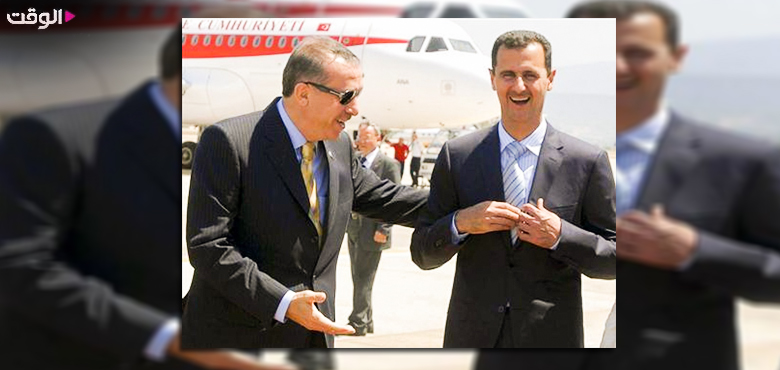Alwaght- One of the influential countries in the decade-long Syrian crisis has been its northern neighbor Turkey, the same country that seized the opportunity caused by anti-government protests in Syria in 2011 in an effort to topple the government in Damascus and advance its plans in the Arab world by reviving its historical role in Muslim world developments. But the other side of the coin was rise of Syrian Kurds who have been struggling to connect three main Kurdish-majority regions in Syria's north to each other and ultimately to the Mediterranean Sea. The project was checkmated by Turkish military actions, however.
In late 2019, Turkey launched Operation Spring of Peace to neutralize the threat of Kurdish militias in northern Syria. Before that, in 2016, it had launched Operation Euphrates Shield to capture the west of the Euphrates.
With the crisis winding down and new variables imposing themselves on the relations among regional states, Syria's opponents, like Turkey and Arab countries, creep on to dialogue with Syrian central government. Recently, a Syrian army general, Haidar Jawad, told the Russian news agency Sputnik that Damascus and Ankara are discussing Eastern Euphrates. Heading the Syrian negotiation team, Jawad said that the key talk topics are "Eastern Euphrates and Turkish military presence in Syria."
Erdogan's Syria policy runs into impasse
Turkey's will to negotiate with the Syrian government should be seen, above all, as a sign of a stalemate in the interventionist and destabilizing policies that President Recep Tayyip Erdogan has pursued over the past decade against Syria.
Turkey's main intervention in Syria has been under the pretext of a program to check the threatening presence of the Kurdistan Workers' Party (PKK) terrorist group in the northern regions of Syria and power gain of Syrian Kurdish groups seen by Ankara as PKK affiliates.
The Syrian Democratic Union Party (PYD), with the cooperation and support of the US, expanded its sphere of influence from 2014 to 2017 in the north and took control of most of strategic areas from ISIS terrorists. This took place at a time when the balance of power in Syria was disrupted and the Syrian army was busy countering the advances of multiple terrorist factions sponsored by a Western-Arab-Israeli front.
In June 2016, the People's Protection Units (YPG), the armed wing of the PYD, captured Manbij town in northwest, gaining control over an area from the Iraqi border to Afrin and creating an interconnected region. While one part of the Syrian Democratic Forces (SDF), which is mainly made up of the YPG, was advancing from Afrin to Tall Rifat and the other part was pressing towards Kobani to Manbij, the north was expected to go under full PYD control. However, in August 2016 the balance began to change.
With Operation Euphrates Shield, Turkey blocked YPG advances. Soon, Syria became a currency to adoption of Turkey's hegemonic policies in the Arab world and diversion of attention from the Turkish internal challenges using populist and nationalist policies in a fierce political competition. In March 2018, Afrin was seized by Turkey and its aligned terrorist militias in Operation Olive Branch. Its sequel was Operation Spring of Peace in 2019 in Eastern Euphrates.
Now, however, amid torrents of internal problems Erdogan is grappling with, Ankara's interventionist policies are at a standstill in many ways. First, unlike past few years, Russia and the US, as influential powers in northern Syria developments, are no longer in favor of Erdogan's plans, and a new round of Turkish adventure has been opposed by these heavyweight actors. Second, with the successive victories of the Syrian army and its allies over terrorist elements and the return of large parts of Syrian territory to the control of the central government, both the political and military threats of Damascus to Turkish adventures have increased considerably and Arab-Syrian resumption of relations can bring about unified Arab opposition to Turkey's interventionist policies.
Why is Turkey sensitive to Eastern Euphrates?
To answer the question why Turkey shows sensitivity to entrenchment of the Kurdish groups in the north, we need to consider political and economic variables.
Politically, Ankara is afraid that power gain of the Kurdish groups in northern Syria can influence pro-separation tendencies of its Kurdish minority. Erdogan seeks to zero this potential influence. This issue seems to be a common concern of Ankara-Damascus talks. According to the first article of the Adana Agreement of 1998 between Ankara and Damascus, Turkey has the right to chase members of the PKK up to five kilometers north of Syria. Therefore, if the Damascus government guarantees it meets Ankara security concerns and considerations, then the Turks will have to withdraw their forces from Syrian territory.
Economically, oil reserves of Eastern Euphrates are tempting to Turkey. Recently, both Turkish and Syrian engineers broke the news about oil reserves on the common borders, saying that they can bring substantial economic benefits to both nations. Prior to the civil war, Assad's government produced between 350,000 and 385,000 barrels of oil production daily throughout the region, which is now controlled by Kurdish groups.
The oil-rich region is along 900 kilometers of common border from Syria's Tell Abyad to Turkey's Akcakale. The high quality of the oil of this region considered, its production can be beneficial to Syria, as well as Turkey which has the capacity to refine 1 million oil barrels daily.
As a conclusion, the Syrian-Turkish talks are caused by the recent regional developments, and Ankara, like the Arab League, has come up with the understanding that the best choice regarding Syria is dialogue and agreement on common matters with Damascus. Economic and political cooperation can pave the way for their normalization, and bring further isolation to Kurdish groups.



























